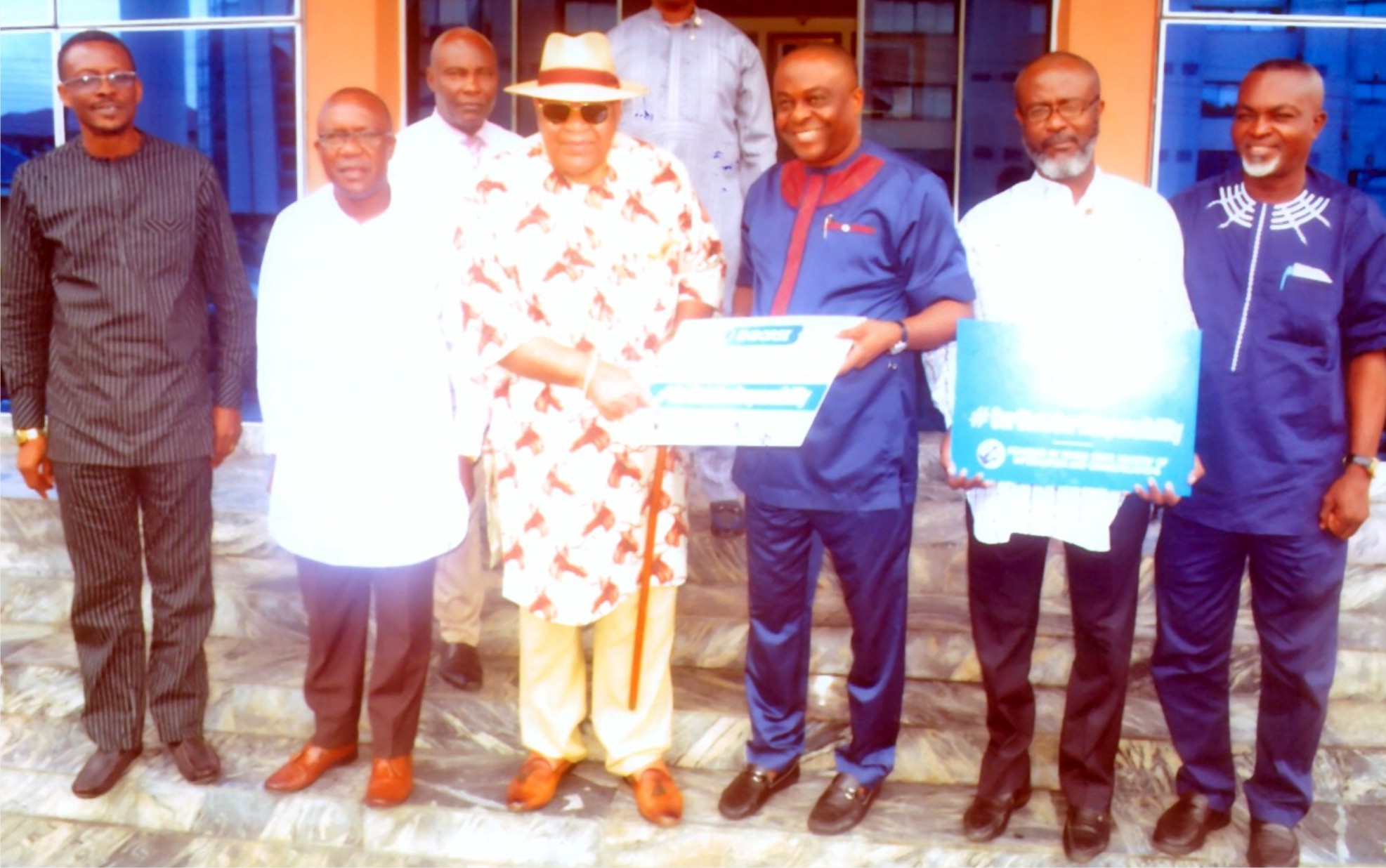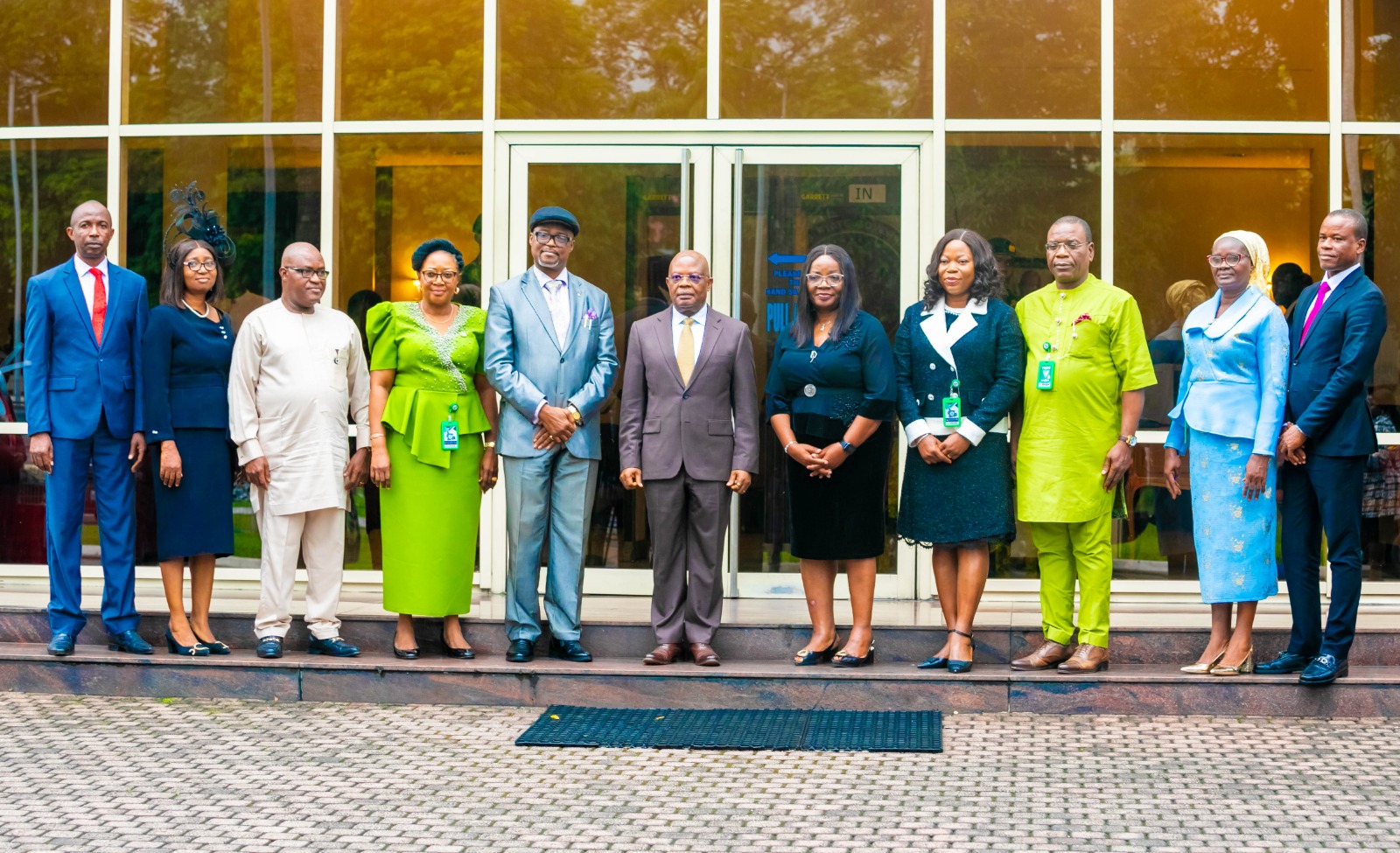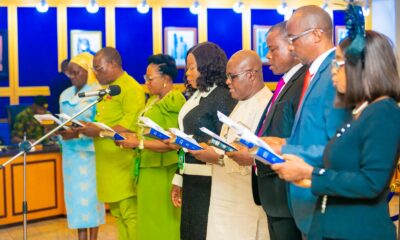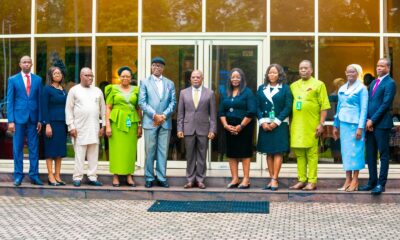Featured
Crime Ambassadors Of Nigeria (CAN)

In a country where many citizens are obsessed with titles to enhance their social standing, a new tag – the Crime Ambassador of Nigeria (CAN) is fast recommending itself for conferment on Nigerians who have drawn international attention and opprobrium to the country, with respect to their involvement in trans-border crimes. And it would seem that the time has come for the formal conferment of such a title starting with deserving Nigerians like those 79 recent suspects of cybercrime in the US currently facing charges in that country’s courts over charges of swindling individuals, companies, charities as well as even churches of millions of dollars, with which they come back to Nigeria to live big without as much as a whimper from their communities over how they suddenly became super rich. According to some posts currently trending on the social media, many of these profiled individuals are seemingly ordinary Nigerian good time folks and regular toasts of their kith and kin as well as social circles.
Interestingly, such miscreants have been with us for a long time since the days when electronic processes in banking commenced around the world in the early nineties. Until then, banking fraud was restricted to local institutions as operations were manual and hardly would any untoward development spread beyond the gates of the bank. With the growth of electronic banking in the nineties, banking operations between individual banks and branches were progressively being synchronized as exchange of banking information, which traditionally were locally subjected to strict confidentiality, became increasingly facilitated with greater ease. But this transition came with a dark side as the bad eggs in the banks found it easier to falsify the now machine readable information, and exploit the system in collaboration with outside scammers. Hence, as the ease of transactions grew, so the liberty to swindle the system also expanded.
Older Nigerians will easily recall the days of ‘419’ in the early nineties when the swindling of foreigners by Nigerian ‘smart alecs’ was rampant with not a few of the culprits, making huge fortunes from the illicit activity and built financial empires that survive till today. They were named ‘419ers’ after Section 419 of Nigeria’s Criminal Code which deals with the crime of obtaining favours through deceit. However, if compared with the earlier day ‘419ers’, the present day fraudsters are light years ahead. The similarities between the two generations of fraudsters if any, go beyond the ways and means of operation. While the older generation depended on the now archaic fax machines that transmitted only data across telephone networks, the new age operators use the much faster and more efficient computer and internet.
Although the focus may be on Nigerians today, participation in internet fraud activities is not confined to Nigerians. The scourge of internet fraud is already a pandemic in the advanced countries where the exercise accounts for global losses estimated at $3 billion annually. Some may therefore be even inclined to see the participation of Nigerians as a mere scratch on the surface.
However, for this country, the increasing involvement of Nigerians in cybercrime especially on the international scale is more than the diplomatic scenario of poor representation of the country abroad by the culprits. In a more profound context, it imposes a negative value system on the growing and impressionable youth as it reinforces the mindset that easy money from crime is the way to go. When the fraudsters succeed in coming home with stashes of cash and spread same in a poverty ridden environment, it becomes difficult to preach any other sermon that runs on the dignity of hard work. The impact of such a syndrome is already incalculable in the Nigerian society as it accounts for the current apocalyptic escalation in crimes such as armed robbery, kidnapping and the ‘yahoo yahoo’ range of rituals-based, nefarious activities.
Today, the Nigerian society lies prostrate before the scourge of kidnapping for ransom, which has turned into a most lucrative business enterprise across the country. All categories of nationals are kidnapped daily for ransom with victims securing their release on the payment of various sums of money and occasionally with items in kind including food stuff and for ladies, sexual favours. The explosion in the crime of kidnapping in Nigeria has proved to outmatch the capacity of the security forces as even their personnel are not spared as victims.
Meanwhile, as the recent case of one Hamisu Wadume, the alleged kidnapper from Taraba State is revealing, the seemingly intractable nature of kidnapping and other heinous crimes in the country, enjoy in many cases the active collaboration of the very security operatives on whom the task of caging the culprits, rests. Wadume was reportedly earlier arrested in Ibi town in Taraba State, in the course of investigations into serial kidnapping cases by some crack police detectives. He was being conveyed to the Police base when soldiers – apparently acting in league with the suspect attacked the police officers, and killed some of them as well as injuring others.
Revelations from the ongoing investigations in the Wadume case clearly point to a wider malady of insider conspiracies between the wave of crimes and the criminals as well components of the security apparatus. It would therefore seem that the country’s fight against violent crimes needs to be targeted at discouraging the lure of easy money among the youths. And the earlier this is done, the better, as the lure to join the ranks of the CANs, is not growing.
Featured
Rivers A Strategic Hub for Nigeria’s Blue Economy -Ibas …Calls For Innovation-Driven Solutions

The Administrator of Rivers State, Vice Admiral (Rtd.) Ibok-Ete Ibas, has emphasized the need for innovation-driven strategies, strategic partnerships, and firm policy implementation to fully harness the vast potential of the blue economy.
Speaking during a courtesy visit by participants of Study Group 7 of the Executive Course 47 from the National Institute for Policy and Strategic Studies (NIPSS) at Government House, Port Harcourt, on Monday, Ibas highlighted the importance of diversifying Nigeria’s economy beyond oil by leveraging maritime resources to create jobs, enhance food security, strengthen climate resilience, and generate sustainable revenue.
The Administrator, according to a statement by his Senior Special Adviser on Media, Hector Igbikiowubo, noted that with coordinated efforts and innovative solutions, the blue economy could serve as a catalyst for inclusive growth, economic stability, and long-term environmental sustainability.
“It is estimated that a fully developed blue economy could generate over $296 million annually for Nigeria, spanning fisheries, shipping and logistics, marine tourism, offshore renewable energy, aquaculture, biotechnology, and coastal infrastructure,” he stated.
“We must transition from extractive practices to regenerative, inclusive, and innovation-driven solutions. This requires political cohesion, intergovernmental collaboration, robust infrastructure, and institutional capacity—all of which must be pursued with urgency and intentionality,” he added.
Ibas urged sub-national governments, particularly coastal states, to domesticate the national blue economy framework and develop tailored strategies that reflect their comparative advantages.
He stressed that such efforts must be guided by disciplined planning, regulation, and investment to maximize the sector’s potential.
Highlighting Rivers State’s pivotal role, the Administrator outlined its strategic advantages as follows:
•Nearly 30% of Nigeria’s total coastline (approximately 853km)
•Over 40% of Nigeria’s crude oil and gas output
•More than 33% of the country’s GDP and foreign exchange earnings
•416 of Nigeria’s 1,201 oil wells, many located in marine environments
•Two of Nigeria’s largest seaports, two oil refineries, and the Nigerian Liquefied Natural Gas (NLNG) terminal in Bonny Island—one of Africa’s most advanced gas facilities
Despite these opportunities, Ibas acknowledged challenges such as pollution, coastal erosion, illegal oil refining, unregulated fishing, inadequate infrastructure, and maritime insecurity.
He reaffirmed his administration’s commitment to institutional reforms, coastal zone management, and inter-agency collaboration to build a governance structure that supports a sustainable blue economy.
“Sustainability must be embedded in our development models from the outset, not as an afterthought. We are actively exploring partnerships in maritime education, aquaculture development, port modernization, and renewable ocean energy. We welcome knowledge-sharing engagements like this to refine our strategies and enhance implementation,” he said.
He urged the NIPSS delegation to ensure their findings translate into actionable recommendations that address the sector’s challenges.
Leader of the delegation, Vice Admiral A.A. Mustapha, explained that the visit aligns with their strategic institutional tour mandate on the 2025 theme: “Blue Economy and Sustainable Development in Nigeria: Issues, Challenges, and Opportunities.”
The group is engaging stakeholders to deepen understanding of policy efforts and institutional roles in advancing sustainable development through the blue economy.
Featured
INEC To Unveil New Party Registration Portal As Applications Hit 129

The Independent National Electoral Commission (INEC) has announced that it has now received a total of 129 applications from associations seeking registration as political parties.
The update was provided during the commission’s regular weekly meeting held in Abuja, yesterday.
According to a statement signed by the National Commissioner and Chairman of the Information and Voter Education Committee, Sam Olumekun, seven new applications were submitted within the past week, adding to the previous number.
“At its regular weekly meeting held today, Thursday 10th July 2025, the commission received a further update on additional requests from associations seeking registration as political parties.
“Since last week, seven more applications have been received, bringing the total number so far to 129. All the requests are being processed,” the commission stated.
The commission revealed the introduction of a new digital platform for political party registration. The platform is part of the Party Financial Reporting and Auditing System and aims to streamline the registration process.
Olumekun disclosed that final testing of the portal would be completed within the next week.
“INEC also plans to release comprehensive guidelines to help associations file their applications using the new system.
“Unlike the manual method used in previous registration, the Commission is introducing a political party registration portal, which is a module in our Party Financial Reporting and Auditing System.
“This will make the process faster and seamless. In the next week, the commission will conclude the final testing of the portal before deployment.
“Thereafter, the next step for associations that meet the requirements to proceed to the application stage will be announced. The commission will also issue guidelines to facilitate the filing of applications using the PFRAS,” the statement added.
In the meantime, the list of new associations that have submitted applications has been made available to the public on INEC’s website and other official platforms.
Featured
Tinubu Signs Four Tax Reform Bills Into Law …Says Nigeria Open For Business

President Bola Tinubu yesterday signed into law four tax reform bills aimed at transforming Nigeria’s fiscal and revenue framework.
The four bills include: the Nigeria Tax Bill, the Nigeria Tax Administration Bill, the Nigeria Revenue Service (Establishment) Bill, and the Joint Revenue Board (Establishment) Bill.
They were passed by the National Assembly after months of consultations with various interest groups and stakeholders.
The ceremony took place at the Presidential Villa, yesterday.
The ceremony was witnessed by the leadership of the National Assembly and some legislators, governors, ministers, and aides of the President.
The presidency had earlier stated that the laws would transform tax administration in the country, increase revenue generation, improve the business environment, and give a boost to domestic and foreign investments.
“When the new tax laws become operational, they are expected to significantly transform tax administration in the country, leading to increased revenue generation, improved business environment, and a boost in domestic and foreign investments,” Special Adviser to the President on Media, Bayo Onanuga said on Wednesday.
Before the signing of the four bills, President Tinubu had earlier yesterday, said the tax reform bills will reset Nigeria’s economic trajectory and simplify its complex fiscal landscape.
Announcing the development via his official X handle, yesterday, the President declared, “In a few hours, I will sign four landmark tax reform bills into law, ushering in a bold new era of economic governance in our country.”
Tinubu made a call to investors and citizens alike, saying, “Let the world know that Nigeria is open for business, and this time, everyone has a fair shot.”
He described the bills as not just technical adjustments but a direct intervention to ease burdens on struggling Nigerians.
“These reforms go beyond streamlining tax codes. They deliver the first major, pro-people tax cuts in a generation, targeted relief for low-income earners, small businesses, and families working hard to make ends meet,” Tinubu wrote.
According to the President, “They will unify our fragmented tax system, eliminate wasteful duplications, cut red tape, restore investor confidence, and entrench transparency and coordination at every level.”
He added that the long-standing burden of Nigeria’s tax structure had unfairly weighed down the vulnerable while enabling inefficiency.
The tax reforms, first introduced in October 2024, were part of Tinubu’s post-subsidy-removal recovery plan, aimed at expanding revenue without stifling productivity.
However, the bills faced turbulence at the National Assembly and amongst some state governors who rejected its passing in 2024.
At the NASS, the bills sparked heated debate, particularly around the revenue-sharing structure, which governors from the North opposed.
They warned that a shift toward derivation-based allocations, especially with VAT, could tilt fiscal balance in favour of southern states with stronger consumption bases.
After prolonged dialogue, the VAT rate remained at 7.5 per cent, and a new exemption was introduced to shield minimum wage earners from personal income tax.
By May 2025, the National Assembly passed the harmonised versions with broad support, driven in part by pressure from economic stakeholders and international observers who welcomed the clarity and efficiency the reforms promised.
In his tweet, Tinubu stressed that this is just the beginning of Nigeria’s tax evolution.
“We are laying the foundation for a tax regime that is fair, transparent, and fit for a modern, ambitious Nigeria.
“A tax regime that rewards enterprise, protects the vulnerable, and mobilises revenue without punishing productivity,” he stated.
He further acknowledged the contributions of the Presidential Fiscal Policy and Tax Reform Committee, the National Assembly, and Nigeria’s subnational governments.
The President added, “We are not just signing tax bills but rewriting the social contract.
“We are not there yet, but we are firmly on the road.”
-

 News17 hours ago
News17 hours agoNAF Disowns Recruitment Adverts, Says It’s Fake
-
Rivers18 hours ago
Okrika Administrator Seeks To Connect Okujagu Ama To National Grid … Donates 30 Life Jackets To Okujagu Ama Boat Drivers
-
News15 hours ago
Rivers Chief Judge Frees 21 Awaiting Trial Inmates
-
Politics17 hours ago
Natasha’s Counsel Writes Senate Over Court Judgment
-
Nation16 hours ago
NIPR Practitioners Urge To Go Beyond Traditional Media Relations To Strategic Leadership Functions
-
Politics18 hours ago
Bayelsa APC Hails Late Buhari As Change Agent In Nigerian Politics
-
News15 hours ago
South-South contributes N34trn to Nigeria’s economy in 2024 – Institute
-
Niger Delta17 hours ago
Police Rescue Kidnap Victim, Recover Pistol In A’Ibom










